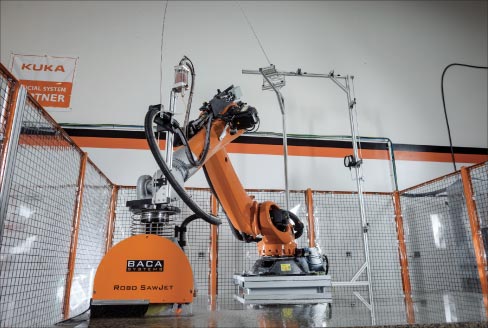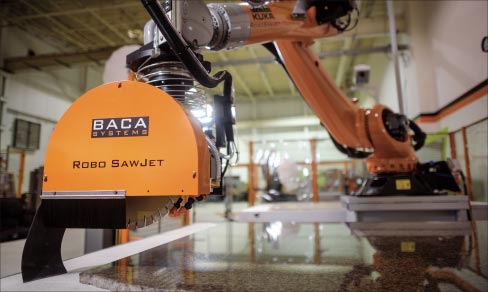Robots Are About People for BACA Systems
Shannon Carey
 |
|
Robo SawJet Photos (2) provided courtesy BACA Systems |
Chuck Russo, president and CEO of BACA Systems in Detroit, is quick to say that fears about robots replacing humans in manufacturing jobs are unfounded. In fact, robots create jobs, he says.
“The companies that install robotic systems as part of their manufacturing process are growing and consequently hire more people,” he said.
And he should know. Russo started in the family robotics business just out of college in the 1980s Robotic Production Technology (RPT), created one of the first production robotic water jet systems for the automotive industry. Even then, Russo knew the worth of the human touch when it came to robotics technology. The people who invented and refined the technology, the people who purchased and used the technology, those were his focus.
Russo went on to leave the company in 2007 when he saw a similar opportunity for robotics in the stone fabrication market. But there was a problem.
“I had a lot to learn about the stone industry,” he said.

 |
| Above and below: custom kitchen, and Crema Marfil vanity, installed by Cutting Edge Countertops using their BACA System RoboSawJet for fabrication. |
 |
 |
Learning on the Job
Russo is a hands-on guy, choosing to be on the factory floor. He knew that to create the best machinery for the stone industry, he would have to become a stone fabricator. During the downturn, he bought the assets of an all-digital stone fabrication shop and in 2008, Surface enCounters was born.
As Russo built Surface enCounters, it allowed him to learn about the challenges that stone fabricators face in manufacturing their products, He began to develop the tools for a robotic solution. In 2014, BACA systems was launched and became the exclusive systems integrator for KUKA Robotics for the U.S. stone industry.
BACA creates the robotic technology, and Surface enCounters serves as the testing ground for that technology. Surface enCounters has grown to be a retail business that produces 1,000 square feet per day, using traditional CNCs alongside the BACA robotic equipment to benchmark the technology in real time. Russo knew that having the model where his fabrication company used the equipment would be “a great launching pad” for the BACA Robo SawJet. “It’s allowed us to be very successful today,” he said.
Customer Culture
At BACA, that culture is completely focused on the customer.
“When we sell a Robo SawJet, it’s a relationship, not just a transaction,” said Russo. “If we listen to our customers every day and empower our people to deliver those things, we’ll have great success.”
At BACA, customers get to visit the factory floor and see the equipment in action, often speaking with Russo himself.
“The customer understands the whole process,” said Russo. “The best place to get valuable feedback from our customers is to be right there on the factory floor.”
It’s that listening ear that has led to many improvements in the hardware and software of the Robo SawJet. Rolling out this year are two enhanced features. Russo said Smart Touch will stop the Robo SawJet if the waterjet mixing tube makes contact with the stone, saving money and potential downtime, and is accomplished without adding any sensors. BACA Saw Wear automatically calibrates the blade to account for normal wear and tear, a task that used to be done manually.
“We’re always about making the system easier to operate,” he said.
Growing Business, Saving Jobs
Back to the “robots replace humans” myth. Recently, Surface enCounters merged with Cutting Edge Countertops of Ohio, balancing the business across a variety of markets, including consumer retail, commercial and more.
The merger brought three additional partners into the operations of the business, resulting in more resources to focus on the day-to-day running of the fabricating business and allowing Russo to focus more time and energy on BACA Systems, and help other fabricators increase their profitability.
Russo said that the combined organization of Surface enCounters and Cutting Edge Countertops employs more than 140 people today, and it is a very automated company. Of course, employees need to learn new skills to operate the Robo SawJet correctly, but Russo said he can’t recall a single customer who has laid off existing workforce due to buying a Robo SawJet.
“They typically develop from within. They still need someone with stone knowledge,” he said. “We’re typically training existing employees to use the machine.”
The software is PC-based, but doesn’t require any CAD knowledge for the operator, so it is easier to learn. Even better, a shop can cross-train three or four people on each machine.
And, the Robo SawJet can keep employees out of harm’s way.
“Doing things manually is not the safest. Business owners are concerned for the safety of their workers and reducing the chance of damage to the materials that are being fabricated. Being able to hire the operators to manually do the manufacturing is challenging, but automated processes allow the people to be in a different environment.”
Implementing a Robo SawJet system can add profit to a company’s bottom line by helping to reduce the two biggest fabricating costs, material and labor, helping the company grow and hire more employees. “This piece of equipment allows the fabricator to nest pieces much closer, increasing the yield 15 to 20 percent as compared to a job cut on a bridge saw,” he said.
Time is saved, too. Russo said the Robo SawJet can perform all work, including arcs, radius cuts, sinks, faucet hole openings during sawing. This eliminates a significant amount of labor and cost that would normally take place after the sawing operation. With the Robo SawJet, two slabs can be cut in 45 minutes, a task that would take six hours manually. That’s a savings of over five hours every two slabs.
The equipment is reliable, too. “Virtually maintenance-free,” added Russo. Fabricators can also improve the quality of the jobs by using the BACA VeinMatch software, which allows material flow to be matched for the best appearance and sent to the customer for approval.
Russo and the BACA Systems team are always keeping an eye out for future applications of robotic technology and ways to improve their customers’ business.
For instance, Russo pointed out that there is a push in other industries towards collaborative applications, where robots work side-by-side with humans as an extra set of hands.
But no matter where the robotics industry is heading, BACA Systems keeps the focus on the needs of the stone industry.
“Nearly two years after launching the company, there is BACA technology all across the country. We have a combination of professional people with over 30 years of experience in the robotics field, plus professional people with equal experience in the stone industry. The biggest resource of any company is the people developing the culture of the company.”
For more information and specs on the Robo SawJet, visit www.bacasystems.com .